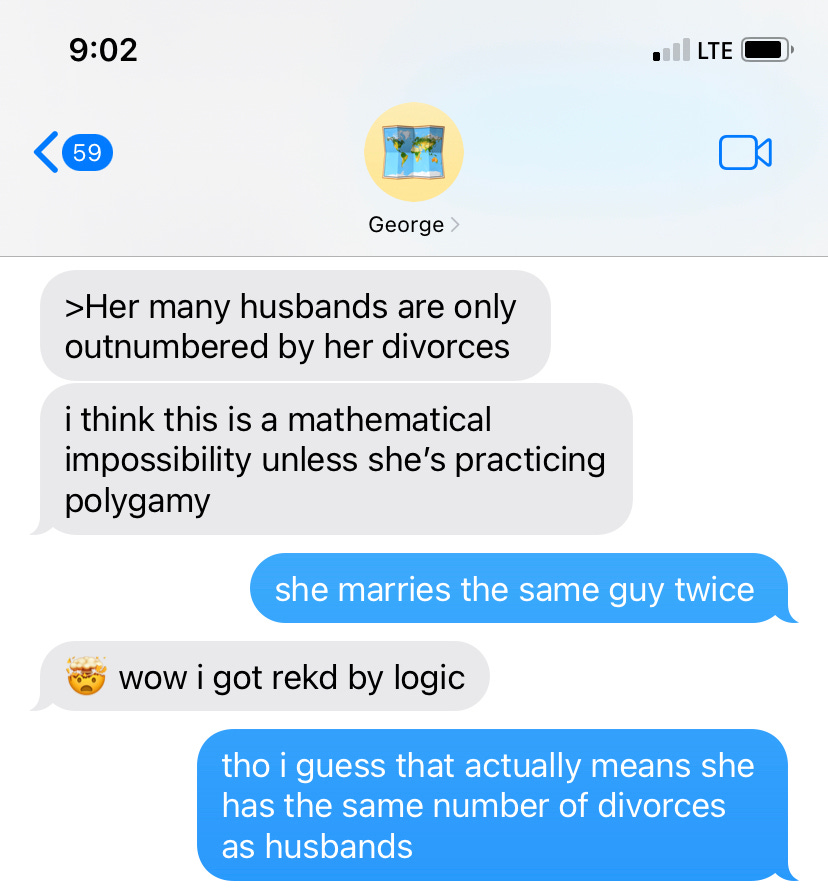Hi y’all,
“Undine Spragg—how can you?”
It’s both the first line of The Custom of the Country, and a forewarning of your reader’s refrain while reading the book. You’re not gonna finish this novel without a few astonished laughs at Undine Spragg’s audacity.
Undine Spragg is a social climber. She’s beautiful, she’s charming, she’s totally shameless, and she’s totally selfish. She comes to New York with her parents from the fictional, midwestern Apex City. She’s determined to fit in with the “right set” and will do just about anything to get in with them— including bankrupting her family, abandoning her friends, and buying a new dress every day, if she absolutely must. “What was the use of being beautiful and attracting attention if one were perpetually doomed to relapse again into the obscure mass of the Uninvited?”
Undine was fiercely independent and yet passionately imitative. She wanted to surprise every one by her dash and originality, but she could not help modeling herself on the last person she met.
Enter Ralph Marvell, a blue-blooded romantic idealist with a dwindling family fortune, absolutely no interest in business, and dreams of being a novelist. They marry.
I wrote in the margin, “lol this man is so doomed.”
What comes thereafter is both completely predictable and totally mesmerizing. Are you a lady who likes to brag about reading books with “unlikable female protagonists”? Undine Spragg puts the other bitches to shame. Her many husbands are only outnumbered by her divorces.
The Custom of the Country is full of elegant dinner parties, fur stoles and damask sofas, opera boxes, and trips to Paris. But the most fun part of this book is Undine’s ability to manipulate. She’s a master, a natural actress, tweaking her tone and affect to produce justttttt the right effect. She plays the role of the ingenue to perfection.
But she’s less an actress than a proto-influencer. She cares most about publicity—her name in the society pages, coupled with lavish descriptions of parties and pretty dresses. She wants what other people have; so she also wants others to want what she has.
It was admiration, not love, that she wanted. She wanted to enjoy herself, and her conception of enjoyment was publicity…the band, the banners, the crowd, the close contact of covetous impulses, and the sense of walking among them in cool security.
Undine’s turbulent rise through the ranks is mirrored by the ascent of her once-and-future husband, Elmer Moffatt. At the beginning of the novel, Elmer is poor, a nobody, just making his start on Wall Street. But he makes the right deals and schemes, eventually winding up an obscenely wealthy tycoon. He repeatedly appears in the novel when the men in Undine’s life are at their most desperate, popping up like a devil on their shoulder to make offers they can’t refuse.
Undine and Elmer can disguise themselves, for a time and while it’s beneficial, to fit in with the old money crowd, but ultimately they’re interlopers, westerners, divorcees. Old money is exclusive but “dowdy,” while “the future belonged to the showy and the promiscuous.”
I don’t think it’s possible to “spoil” a book like The Custom of the Country because any reader worth her salt can figure out the outline of the novel by page 50 (not that there aren’t some surprises along the way). This is to Edith Wharton’s credit.
Speaking of obvious endings, I just finished watching Breaking Bad this week.1
If Breaking Bad is an indictment of capitalism, a tragic tale of how pointlessly and violently acquisitive one man can become—well, the same thing can be said of The Custom of the Country (though admittedly, “violent” would be an exaggeration). Both Walt and Undine are ambitious, manipulative, ruthless materialists, and concerned foremost with their reputation. The reader/viewer roots for their success, even at the expense of more innocent, “good” characters.2 But compared to Undine, Walt’s a total softie. At least Walt pretends that it's all for his family. At least Walt cries when Hank dies.
Walt dies alone, having destroyed everything and everyone he loves, with only a flicker of self-awareness to stand in for redemption. Undine gets everything she ever wanted—all the money, all the invitations, and even custody of her son. But she too is denied the possibility of change, of happiness, of empathy, or of an end to all this ambition—perhaps in a more damning way than Walt is. As long as there exists a dress she doesn’t own or a party that she’s not invited to, she’ll never be happy. Whose punishment is crueler, Sisyphus’ or Macbeth’s?
Alright, on that decidedly dumb note, you can buy The Custom of the Country here, and I’ll receive a small commission.
xoxo,
Book Notes
Let’s play a quick game of “Marry, Fuck, Kill”—horrible spouse edition. You can only choose each character once lol
It took me 10 years and the urgings of three different boyfriends, but by God, I finally finished it! It was fine.
I know I’m in the minority of viewers, but I fucking hated Walt, which was the no.1 reason I found it so hard to finish the show. Undine was easy for me to root for, even though she’s a total monster too.




